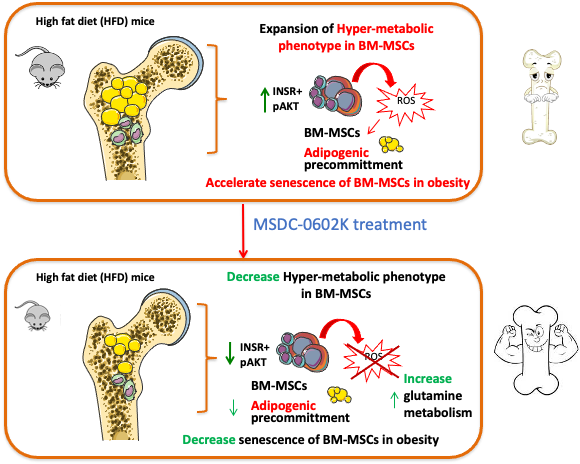Characterization of novel antidiabetic drug with less side effects on bone metabolism
Thiazolidinediones (TZDs) belong to the category of antidiabetic drugs that increase insulin sensitivity. However, the first generation of TZDs show several side effects, including increased formation of large fat cells (adipocytes) in the bone marrow associated with a higher risk of fractures and bone loss. These side effects are thought to be caused by the strong binding of TZDs to the nuclear receptor PPARγ. In a new study published in the journal Molecular Metabolism, we investigated how administration of MSDC-0602K, a new TZD analog with lower affinity for PPARγ receptors, affects bone metabolism.
We found that administration of MSDC-0602K to obese mice for 8 weeks resulted in significantly better bone microstructure and bone strength, along with an increased proportion of smaller adipocytes in the bone marrow, compared to the original TZDs. We also investigated the effects of MSDC-0602K at the molecular level using primary cell cultures. Bone marrow mesenchymal stem cells from mice treated with MSDC-0602K differentiated to an increased extent into the form of osteoblasts (bone cells), did not undergo as much aging and showed increased cellular metabolism of glutamine, which is important for bone formation (osteogenesis).
Taken together our findings suggests that the new TZD analog could increase insulin sensitivity with less adverse effects on bone quality and mesenchymal stem cell metabolism compared to the original TZDs. Thus, MSDC-0602K could replace older antidiabetic drugs in the treatment of metabolic and bone diseases.

Benova, A., M. Ferencakova, K. Bardova, J. Funda, J. Prochazka, F. Spoutil, T. Cajka, M. Dzubanova, T. Balcaen, G. Kerckhofs, W. Willekens, G. H. van Lenthe, G. Alquicer, A. Pecinova, T. Mracek, O. Horakova, M. Rossmeisl, J. Kopecky and M. Tencerova (2022). "Novel thiazolidinedione analog reduces a negative impact on bone and mesenchymal stem cell properties in obese mice compared to classical thiazolidinediones." Mol Metab 65: 101598. IF = 8.568 DOI
